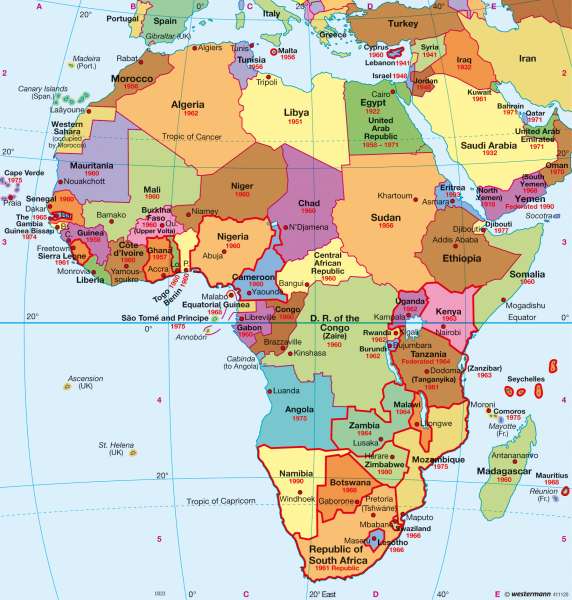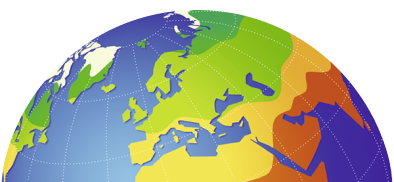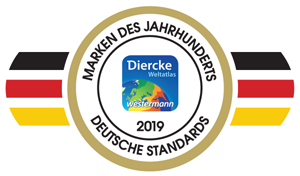Africa — Political map
Africa - Countries and history
978-3-14-100790-9 | Page 155 | Ill. 3

Information
The political map of Africa shows the independent state structure of the post-colonial era. The first changes came with the end of World War II. The defeated German Empire had to renounce its colonial possessions, which fell as mandated territories to the victorious powers. In 1922, Great Britain declared Egypt an independent kingdom, but held a number of privileges with regard to foreign policy and the Suez Canal. The long-time independent Ethiopia was conquered by fascist Italy in 1935/36, although in 1941, was released back into independence by Great Britain. During World War II, Italy lost all its colonies except for Somalia, which was awarded a ten year status as a UN trust territory in 1950.Release to independence
After the dissolution of colonial empires in Asia and America, there were increased cries for independence in the countries of the African continent. In the decades after World War II, most African political systems were gradually released to autonomy by the European colonial powers. Almost everywhere, this was made, more or less, through peaceful means. It was only in the former French colony of Algeria that a bitter, harsh war of liberation began in 1954 and lasted until 1962.
The two great colonial powers France and Great Britain followed decolonisation with different approaches and goals. Great Britain followed the strategy of gradual convergence with the state autonomy through constitutional reforms and the creation of political parties and parliaments. Conflicts developed in Kenya where the secret society of the Mau Mau terrorists tried to enforce freedom through terror (1952-54), and in Rhodesia, which later became Zimbabwe. The Constitution of 1965, which secured the political power of the white minority, was revised after a civil war. In 1968, Great Britain released its last African colony, Swaziland, to independence. Almost all former British colonies remained a member of the "Commonwealth of Nations" and continue to accept the British monarch as head of state.
France, however, pursued the idea of a "Union Francaise"- free and equal citizens who should speak the same language and enjoy the same rights. It soon became clear that this solution did not comply with the interests of the countries striving for national self-determination. For Algeria, in particular, this became a bloody war of liberation. The French colonial empire broke up during this conflict in 1960 and Algeria gained its independence in 1962.
Conflicts in the new nations
In 1960, Belgium released its colony of Congo in a rush to freedom. The result was chaotic turmoil and divisions which only abated after 1965. Portugal, however, attempted to bind its colonies more closely to the motherland as overseas provinces. It was only after the revolution of 1974, that it hastily renounced its colonial claims and Angola developed in the subsequent civil war.
South Africa had come under its apartheid policy, in which the white minority discriminated against the black majority for decades, under the pressure of world opinion. The withdrawal of the mandate for Southwest Africa (Namibia) did not have any consequences for a long time. After bloody riots in the 1980's, the abolition of apartheid was proclaimed in 1990 and Namibia granted independence. In 1994, Nelson Mandela became the first black president resulting from the first free elections.
In 1993, Ethiopia had to accept the secession of Eritrea, which led to war in the wake of existing, stagnating clashes.
With the collapse of the Soviet Union and the communist bloc, the bloody proxy conflicts that were conducted from 1960 to 1989 by the U.S. and USSR in Africa, ended. Consequently, the wake of "good governance" discussions about democracy trends could occur in some African countries in the 1990's. However, there currently does not exist on any other continent, so many armed conflicts and such a high number of IDPs, as in Africa.
D. Bode, K. Lückemeier, B. Richter; Ü: C. Fleming




